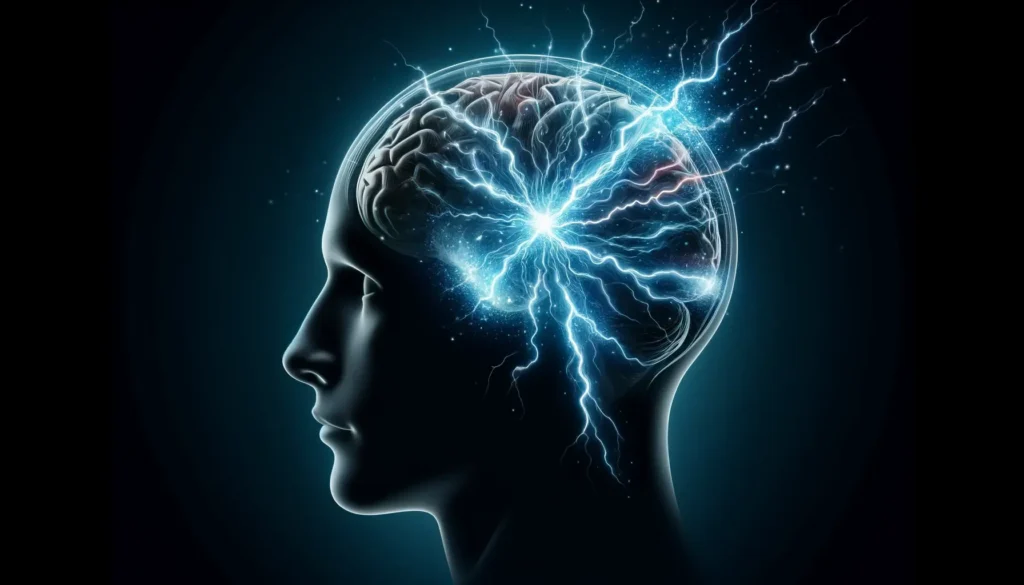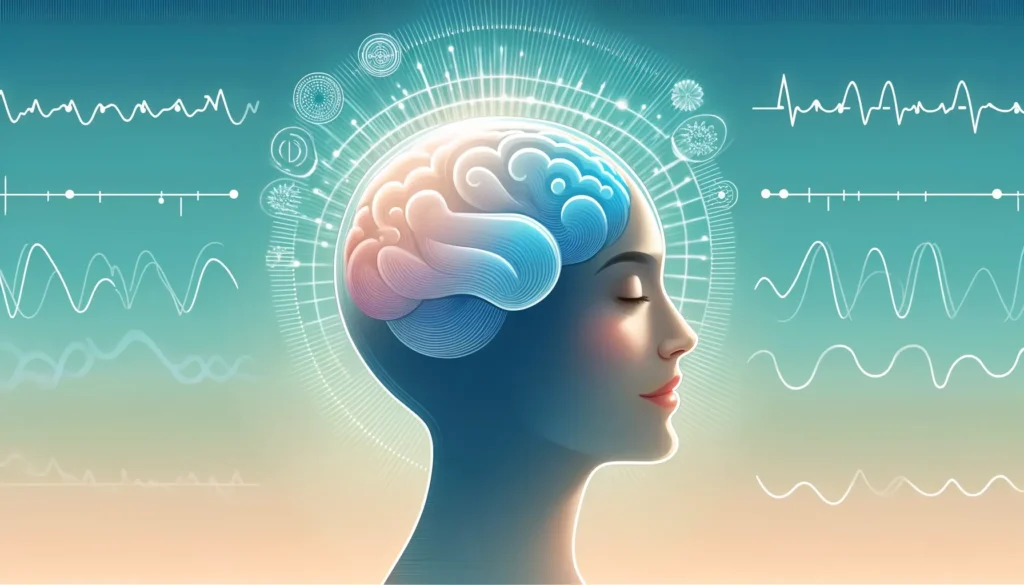This article will go over brain zap, what they are, how a brain zap feels, what causes them, and how their connection to antidepressant discontinuation.
Definition of Brain Zaps
Brain zaps, also known as brain blink, brain shivers, brain shocks, brain shakes, brain flashes, or brain flips, are a perplexing neurological phenomenon. They are experienced as withdrawal symptoms from certain medications, particularly antidepressants. SSRIs (selective serotonin reuptake inhibitors), which are a common form of antidepressants, are most often linked with brain zaps.
People who experience brain zaps can often be confused about what is causing these symptoms, as they are less well publicized than other withdrawal symptoms from stopping antidepressants or other medications. Still, peer reviewed studies have found considerable evidence that brain zaps are a common symptom of antidepressant discontinuation syndrome.
The term “brain zaps” describes the sensation of these unpleasant symptoms. When people experience brain zaps, they feel a sudden jolt or shock originating from the brain and radiating throughout the head and sometimes into other parts of the body. The experience of brain zaps is widely reported among individuals who have discontinued or reduced their dosage of certain medications, especially their antidepressant dosage.
What Causes Brain Zaps?
The exact cause of brain zaps is not fully understood, but it is believed to involve disruptions in the brain’s neurotransmitter systems, particularly those involving serotonin. It is best known as a symptom of antidepressant withdrawal. People with mental health conditions are thus at the highest risk, since they are the most likely to take these medications, and thus to experience antidepressant withdrawal effects.
Antidepressant Discontinuation Syndrome
For this reason, some people refer to brain zap symptoms as being part of antidepressant withdrawal syndrome, a term that has yet to be clinically defined. Many medications, such as selective serotonin reuptake inhibitors (SSRIs) and serotonin-norepinephrine reuptake inhibitors (SNRIs), work by altering the levels of serotonin in the brain.
When these medications are abruptly discontinued or dosage is reduced too rapidly, it can lead to imbalances in serotonin levels, which may contribute to the occurrence of brain zaps. Serotonin is an important neurotransmitter and a rapid decrease (resulting from stopping the supplementation caused by medicine) is thought to be the source of these issues.
Symptoms of Brain Zaps
Describing the mechanism that creates brain zaps is educational. But recognizing them is difficult without knowing the answer to a more practical question–What do brain zaps feel like?
Physical Symptoms
Symptoms of brain zaps vary among individuals but commonly include sensations of electrical shocks, tingling, dizziness, lightheadedness, vertigo, and sometimes auditory disturbances such as ringing in the ears. These shock like sensations are a sensory disturbance. They are typically transient and often occur when moving the eyes, especially during rapid eye movements or changes in visual focus. Some individuals may also experience accompanying symptoms such as headaches, nausea, and disorentation.
Other symptoms can include flu like symptoms, including chills and sweating. These uncomfortable symptoms may disrupt sleep, which has its own negative effects. These are characteristic of withdrawal symptoms from other psychotropic medications and from illicit substances like opiates, benzodiazapenes, or alcohol.
Psychiatric Symptoms
Evidence suggests that more than half of people suffering from antidepressant discontinuation syndrome experience anxiety. This is understandable, given that these medications are often prescribed to treat anxiety. A brain zap can be accompanied by an increase in thoughts that were previously suppressed by the medication. This can constitute anxious thoughts, but can also include suicidal thoughts.
Suicidal thoughts are an underappreciated symptom of antidepressant discontinuation syndrome, but perhaps one of the most troubling. For this reason, people taking the medication to address severe depression, who have experienced suicidal ideation in the past, are advised to have medical supervision while going through the withdrawal process.
How Long Does Antidepressant Withdrawal Last?
The “electric shock” feeling of a brain zap typically lasts less than a minute. However, this symptom (and others) of antidepressant withdrawal can persist with repeated experiences of brain flips for up to a month. If you find that you can tolerate these feelings, or if they are less unpleasant than other side effects you experienced, you may not need medical intervention.
However, contacting your healthcare provider is advised if brain zaps or other symptoms of antidepressant withdrawal are causing you significant distress. If you feel in danger of more serious problems, contact an emergency room without delay.
Medications That Can Cause Brain Zaps
Brain zaps are commonly reported during withdrawal from antidepressants such as paroxetine (Paxil), sertraline (Zoloft), venlafaxine (Effexor), and duloxetine (Cymbalta), among others.
However, brain zaps can also occur with other medications that affect neurotransmitter systems, including certain antipsychotics, benzodiazepines, and recreational drugs. They can even happen when a person switches to a different medication after taking one for several weeks or months.
The severity and duration of brain zaps can vary depending on factors such as the individual’s sensitivity to medication changes, the specific medication involved, and the duration and dosage of medication use.
How Brain Zaps Affect Daily Functioning
Although brain zaps and other antidepressant withdrawal symptoms are generally considered benign and temporary, they can be distressing and disruptive to daily functioning for some individuals. In severe cases, they may interfere with activities such as driving, working, or concentrating. These interferences are often due to sensory disturbances that impair individuals’ ability to manage daily tasks.
Impacts on Cognition
The unpredictable timing of brain zaps can disrupt cognitive processes and attention, making it difficult to focus on tasks or maintain mental clarity. This can impair productivity and performance in various aspects of daily life, including work, school, and social interactions. Additionally, the accompanying symptoms such as dizziness, lightheadedness, and mood swings can further exacerbate the impact on daily functioning.
People can experience brain zaps at any time, which is inconvenient for people with mentally taxing jobs. Additionally, people with other CNS disorders like seizure disorders or traumatic brain injuries are likely to have more intense effects from brain shivers or brain zaps.
Impacts on Emotion
Furthermore, the distress caused by brain zaps may contribute to increased stress and anxiety, which can further impair cognitive function and emotional well-being. In severe cases, individuals may feel overwhelmed or incapacitated by the frequency or intensity of brain zaps, leading to feelings of frustration, isolation, or hopelessness. People with other mental health conditions are at particular risk for emotional symptoms.
Overall, the disruptive effects of brain zaps underscore the importance of effective management strategies and support from healthcare professionals to minimize their impact on daily functioning and improve overall quality of life.
How to Prevent Brain Zaps and Other Withdrawal Symptoms
Going “cold turkey” (meaning abruptly stopping the medicine) after taking the medication for several months or longer puts a person at higher risk of brain zaps. People who abruptly stop their medication often experience brain zaps within a week of their last dose. Although the vast majority of these symptoms typically resolve within a few weeks, the electric shock sensation is unpleasant and many people want to avoid brain zaps.
The Primary Care Companion’s Advice
The Primary Care Companion for CNS Disorders is a resource for physicians who treat issues like brain zaps. It provides general guidelines, evidence based best practices, and advice for doctors who are trying to prevent brain zaps and other elements of antidepressant withdrawal syndrome.
Based on a systematic review of literature on the subject, the Companion recommends the following management strategies:
Gradually Tapering off Medication
Management strategies for brain zaps typically involve gradual tapering of medication under the guidance of a healthcare professional to minimize withdrawal symptoms. “Gradually tapering” refers to slowly decreasing the dose to prevent abrupt withdrawal. If a person can gradually taper off their medicine instead of going “cold turkey,” they may be able to avoid the electric shock sensations and other withdrawal effects during the tapering process.
Changing Medicine or Reinstating Medicine
In some cases, switching to a longer-acting medication or temporarily reinstating the original medication at a reduced dosage may help alleviate symptoms before discontinuation is attempted again. Longer lasting medications are less likely to induce withdrawal effects. This is due in part to their long half life, meaning that they stay in a person’s system for a long time after the last usage.
Other Causes of Brain Zaps
In addition to medication-related causes, brain zaps have also been reported in association with other conditions and factors, such as anxiety disorders, stress, sleep disturbances, and changes in brain chemistry. Some individuals may experience similar sensations during episodes of sleep paralysis or as a side effect of certain medical procedures, such as electroconvulsive therapy (ECT).
Research on brain zaps is relatively limited, and further investigation is needed to fully understand the underlying mechanisms and effective management strategies. However, anecdotal reports suggest that brain zaps tend to diminish in frequency and intensity over time as the brain adjusts to changes in medication or other factors.
In the meantime, individuals experiencing brain zaps are encouraged to seek support from healthcare professionals and explore coping techniques such as relaxation exercises, mindfulness, and maintaining a healthy lifestyle to help manage withdrawal and promote overall well-being.
Turning Point of Tampa Treats Dual Diagnosis and Mental health
The mental health professionals at Turning Point of Tampa are equipped to help you understand your regimen of medicine and manage side effects, as well as any withdrawal you face from prescribed medications or illicit substances.
Understanding how brain zaps feel helps our clinical team to address what is going on and help determine what the cause of discomfort. Choosing to face addiction when mental health problems have been a concern can create sensory disturbance and disrupt sleep.
Our doctors are well versed in addressing withdrawal symptoms.
If you or a loved are seeking help, we will guide you through the process of addressing certain medications and help you through the tapering process.






